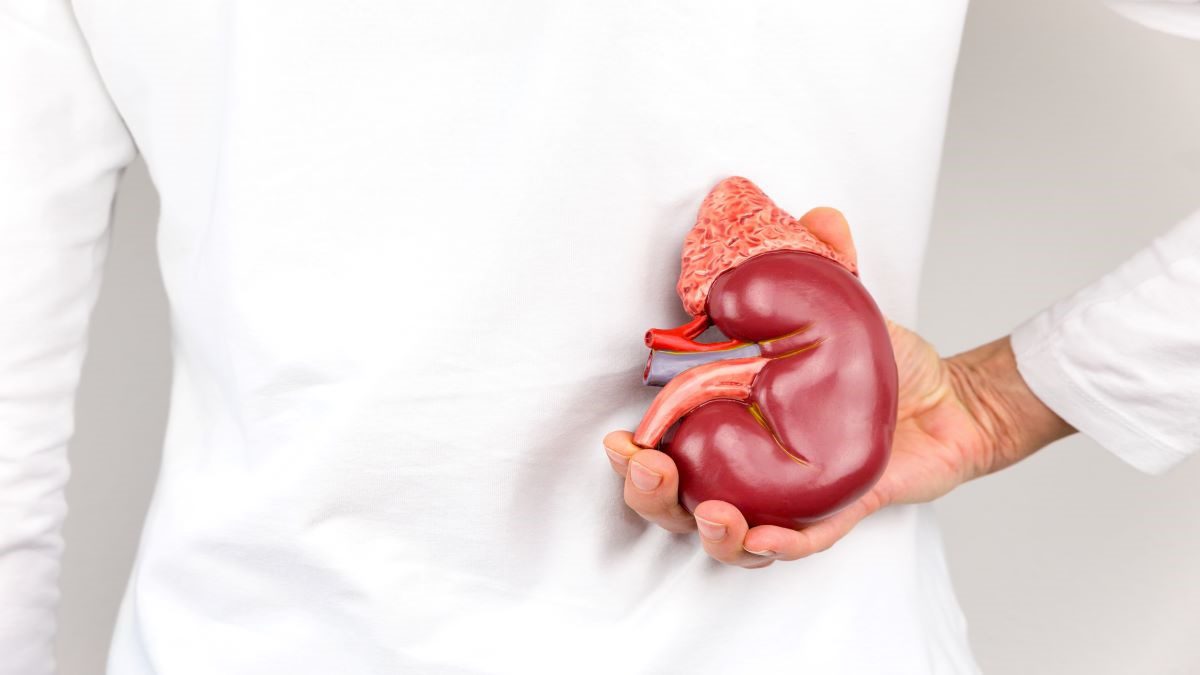Kidney stones are clusters of crystallized salts and minerals formed inside the kidneys. This condition can be uncomfortable and painful and should be treated at early stages to avoid complications. Kidney stones may impact any part of the urinary tract.
Kidney stones types
There are several types of kidney stones. Knowing which type of stones the patient has may help reduce the risk of repeated stone formation in the future and identify what caused stone development.
There are four common kidney stones types – calcium stones, struvite stones, uric acid stones and cystine stones. Let’s describe each of them more closely.
Calcium stones. It is the most common type of kidney stone. It can occur in the form of calcium oxalate or calcium phosphate. Therefore, excess of any of these substances can be a cause of kidney stone development. We as humans get oxalate in two ways: produce it by ourselves in the liver or get it from the diet. For example, nuts, chocolate, some fruits and vegetables are oxalate-rich products. In addition to the dietary factors, an increase of calcium and oxalate in the urine can result from vitamin D supplements, intestinal bypass surgery or certain metabolic disorders.
Renal tubular acidosis, in turn, would impact the development of calcium phosphate stones. The same is true with certain medications for seizures and migraines treatment.
Struvite stones. This type of kidney stone forms as a result of urinary tract infections. Struvite kidney stones can occur with only a few symptoms and not cause a lot of discomfort. Despite this, they grow fast and become quite big.
Uric acid stones. Loss of a significant amount of fluid is the primary cause of uric acid stones. Therefore, people suffering from chronic diarrhea or malabsorption are at higher risk. In addition, those who stick to a high-protein diet are also more tend to the development of uric acid stones. Other conditions that increase the risk of developing this kidney stones type are diabetes and metabolic syndrome. Some genetic factors can also be associated with elevated risks of uric acid stones formation.
Cystine stones. These kidney stones form due to cystinuria, which causes excessive excretion of specific amino acid by the kidneys. This disorder is inherited, meaning that it occurs because of the abnormalities in the genes.
What causes kidney stones formation?
There is no single identified cause of kidney stones. Usually, a group of risk factors lead to a change in urine composition. Kidney stones will form when the amount of crystal-forming substances exceed the amount that the fluid in the urine can dilute. Lack of compounds that prevent crustal formation creates a favourable condition for kidney stones development.
Risk factors that lead to kidney stones formation include:
- dehydration
- obesity
- high-protein, high-salt or/and high-sugar diet
- family or personal history
- digestive diseases (inflammatory bowel disease, chronic diarrhea)
- gastric bypass surgery
- conditions like cystinuria, hyperparathyroidism, tubular acidosis and repeated urinary tract infections
- intake of certain dietary supplements
Symptoms of a kidney stone
Usually, the formation of the stone in a kidney doesn’t cause any symptoms. However, the patient starts experiencing discomfort and pain when the kidney stone begins moving around in the kidney or passing to the ureter. The ureter is a tube through which kidneys connect to the bladder. Therefore, if the stone becomes stuck there, it can block the urine flow. This, in turn, would cause kidney swelling and spasms of the ureter. Both processes are painful. At this stage, the patient may experience some of the following symptoms:
- intense, sharp pain in the side and back, below the ribs
- pain that spreads to the lower part of the abdomen and further to the intersection of thighs and abdomen
- pain that has an unsteady intensity and a wavy pattern
- painful or burning sensations during urination
- a frequent need to urinate
- urinating more often than usual
- urinating in small amounts
- vomiting, nausea
- abnormal urine colour – pink, red or brown
- cloudy urine
- foul-smelling urine
- fever and chills (in case of infection)
Kidney stone pain is not steady. Instead, it can change location and intensity as the stone moves in the kidney or through the urinary tract.
Kidney stone treatment
It is essential to see a doctor as soon as you notice any of the symptoms of kidney stones listed above or have some concerns. It can help identify and apply the treatment of kidney stones at the early stage and prevent permanent damage. Sometimes it is enough to take pain medication to reduce the discomfort and drink a lot of water to pass the stone. In other cases, the patient may need removal surgery. The doctor can also advise you about preventive treatment to reduce the risks of kidney stones formation.
Click Here to read about Treatment.
















Leave a Reply
You must be logged in to post a comment.